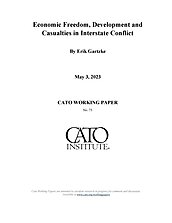Theory and anecdote associate industrial development with the increased lethality of conflict. Other arguments suggest ways that prosperous countries might be able to reduce battlefield casualties, if only for themselves. Yet, economic freedom seems to suggest a motive for prosperous nations to reduce the casualties they impose on other nations. Existing explanations focus on capabilities, rather than on the willingness of prosperous nations to engage in more intensive types of military violence. I argue that the forms of development generally associated with free markets and economic competition alter the motivations of developed countries, leading to a shift away from high-casualty territorial conflicts and toward less deadly forms of contestation over regime or policy differences. To test this argument, I examine the relationship between economic development and interstate battle deaths using three different conflict datasets and taking into account a variety of other factors. My findings support this demand-side argument; as development increases, casualties decline for both developed states and for their opponents.
Economic Freedom, Development and Casualties in Interstate Conflict
The idea that territorial aggrandizement affords nations significant power in the 21st century is nostalgic, at best.
